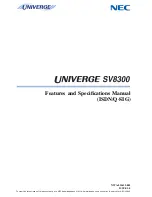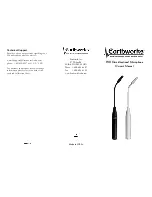
SilverBack V Camera-Mountable Fiber Optic Transmission System
© 2021 MultiDyne, Inc.
Made in the USA
Page
19
The camera unit video settings will need to be set to match the camera's output video format. Please
refer to the Configuration and Operations section of this manual for more information.
Camera Reference Sync Connections
Connect the SilverBack V camera unit REF output to camera REF/SYNC input using a BNC to HD-BNC
cable. A valid analog black burst or tri-level signal must be connected to the base unit REF input to
provide this reference signal to the camera.
If the camera requires SDI reference, connect one of the 3G SDI return outputs on the SilverBack V
camera unit to the REF input on the camera. A valid SDI signal must be connected to the base unit on
this return path to provide this SDI reference to the camera.
Timecode Connections
The SilverBack V camera unit has a single HDBNC connector for timecode, and the port direction is
configured as either an input or output in the system menus. Connect the timecode connector on the
SilverBack V camera unit to the appropriate timecode connector on the camera based on the desired
workflow.
Some cameras utilize a single connector for timecode. In this case, ensure that the timecode port
direction on the camera is set accordingly.
Secondary SDI Connections
The SilverBack V camera unit is equipped with one or more secondary SDI paths, which function as
camera sends, returns, or both. These SDI connections only support data rates up to 3G (they are not 6G
or 12G capable).
The number of secondary SDI connections on the camera unit and their directions varies from model to
model. These secondary SDI connections on the camera unit are highlighted in green and the label
indicates their direction. On certain models, some of the secondary SDI connections can be re-assigned
in the settings menu to connect to a built-in internal viewfinder switch.
Built-in Viewfinder Switch
On certain SilverBack V camera unit models, some of the secondary SDI connections can be re-assigned
in the Settings menu to connect to a built-in internal viewfinder switch. The camera unit configurations
that support a built-in viewfinder switch are shown in the table below.
Configuration
C3EO
C3GX
C2X2
C4K1
C4K2
C42R
C44R
C3X3
Viewfinder Switch
Yes
Yes
Yes
Yes
Yes
Yes
Yes
Yes
There are three types of 3G-SDI cards that can be installed in internal card slots: 2Tx, 2Rx, and TRx.
Typically, a VF-capable card is installed in the slot closest to the Ethernet or audio connectors. VF mode
port connections are highlighted in magenta on the label. Use the Video Settings menu to enable the
viewfinder switch and choose the card slot to assign it to.
















































